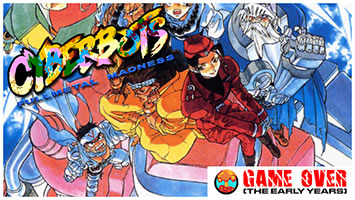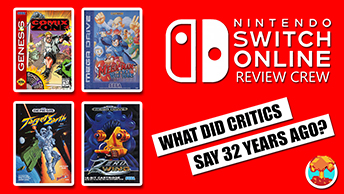- CLASSIC MAGAZINES
- REVIEW CREW
A show recapping what critics thought back
when classic games first came out! - NEXT GENERATION'S BEST & WORST
From the worst 1-star reviews to the best
5-stars can offer, this is Next Generation! - NINTENDO POWER (ARCHIVE)
Experience a variety of shows looking at the
often baffling history of Nintendo Power! - MAGAZINE RETROSPECTIVE
We're looking at the absolutely true history of
some of the most iconic game magazines ever! - SUPER PLAY'S TOP 600
The longest and most ambitious Super NES
countdown on the internet! - THEY SAID WHAT?
Debunking predictions and gossip found
in classic video game magazines! - NEXT GENERATION UNCOVERED
Cyril is back in this spin-off series, featuring the
cover critic review the art of Next Generation! - HARDCORE GAMER MAGAZING (PDF ISSUES)
Download all 36 issues of Hardcore Gamer
Magazine and relive the fun in PDF form!
- REVIEW CREW
- ELECTRONIC GAMING MONTHLY
- ELECTRONIC GAMING MONTHLY RANKS
From Mario to Sonic to Street Fighter, EGM
ranks classic game franchises and consoles! - ELECTRONIC GAMING MONTHLY BEST & WORST
Counting down EGM’s best and worst reviews
going year by year, from 1989 – 2009! - ELECTRONIC GAMING BEST & WORST AWARDS
11-part video series chronicling the ups and
downs of EGM’s Best & Worst Awards!
- ELECTRONIC GAMING MONTHLY RANKS
- GAME HISTORY
- GAME OVER: STORY BREAKDOWNS
Long-running series breaking down game
stories and analyzing their endings! - A BRIEF HISTORY OF GAMING w/ [NAME HERE]
Real history presented in a fun and pithy
format from a variety of game historians! - THE BLACK SHEEP
A series looking back at the black sheep
entries in popular game franchises! - INSTANT EXPERT
Everything you could possibly want to know
about a wide variety of gaming topics! - FREEZE FRAME
When something familiar happens in the games
industry, we're there to take a picture! - I'VE GOT YOUR NUMBER
Learn real video game history through a series
of number-themed episodes, starting at zero! - GREAT MOMENTS IN BAD ACTING
A joyous celebration of some of gaming's
absolute worst voice acting!
- GAME OVER: STORY BREAKDOWNS
- POPULAR SHOWS
- DG NEWS w/ LORNE RISELEY
Newsman Lorne Riseley hosts a regular
series looking at the hottest gaming news! - REVIEW REWIND
Cyril replays a game he reviewed 10+ years
ago to see if he got it right or wrong! - ON-RUNNING FEUDS
Defunct Games' longest-running show, with
editorials, observations and other fun oddities! - DEFUNCT GAMES QUIZ (ARCHIVE)
From online quizzes to game shows, we're
putting your video game knowledge to the test!- QUIZ: ONLINE PASS
Take a weekly quiz to see how well you know
the news and current gaming events! - QUIZ: KNOW THE GAME
One-on-one quiz show where contestants
find out if they actually know classic games! - QUIZ: THE LEADERBOARD
Can you guess the game based on the classic
review? Find out with The Leaderboard!
- QUIZ: ONLINE PASS
- DEFUNCT GAMES VS.
Cyril and the Defunct Games staff isn't afraid
to choose their favorite games and more! - CYRIL READS WORLDS OF POWER
Defunct Games recreates classic game
novelizations through the audio book format!
- DG NEWS w/ LORNE RISELEY
- COMEDY
- GAME EXPECTANCY
How long will your favorite hero live? We crunch
the numbers in this series about dying! - VIDEO GAME ADVICE
Famous game characters answer real personal
advice questions with a humorous slant! - FAKE GAMES: GUERILLA SCRAPBOOK
A long-running series about fake games and
the people who love them (covers included)! - WORST GAME EVER
A contest that attempts to create the worst
video game ever made, complete with covers! - LEVEL 1 STORIES
Literature based on the first stages of some
of your favorite classic video games! - THE COVER CRITIC
One of Defunct Games' earliest shows, Cover
Critic digs up some of the worst box art ever! - COMMERCIAL BREAK
Take a trip through some of the best and
worst video game advertisements of all time! - COMIC BOOK MODS
You've never seen comics like this before.
A curious mix of rewritten video game comics!
- GAME EXPECTANCY
- SERIES ARCHIVE
- NINTENDO SWITCH ONLINE ARCHIVE
A regularly-updated list of every Nintendo
Switch Online release, plus links to review! - PLAYSTATION PLUS CLASSIC ARCHIVE
A comprehensive list of every PlayStation
Plus classic release, including links! - RETRO-BIT PUBLISHING ARCHIVE
A regularly-updated list of every Retro-Bit
game released! - REVIEW MARATHONS w/ ADAM WALLACE
Join critic Adam Wallace as he takes us on a
classic review marathon with different themes!- DEFUNCT GAMES GOLF CLUB
Adam Wallace takes to the links to slice his way
through 72 classic golf game reviews! - 007 IN PIXELS
Adam Wallace takes on the world's greatest spy
as he reviews 15 weeks of James Bond games! - A SALUTE TO VAMPIRES
Adam Wallace is sinking his teeth into a series
covering Castlevania, BloodRayne and more! - CAPCOM'S CURSE
Adam Wallace is celebrating 13 days of Halloween
with a line-up of Capcom's scariest games! - THE FALL OF SUPERMAN
Adam Wallace is a man of steel for playing
some of the absolute worst Superman games! - THE 31 GAMES OF HALLOWEEN
Adam Wallace spends every day of October afraid
as he reviews some of the scariest games ever! - 12 WEEKS OF STAR TREK
Adam Wallace boldly goes where no critic has
gone before in this Star Trek marathon!
- DEFUNCT GAMES GOLF CLUB
- DAYS OF CHRISTMAS (ARCHIVE)
Annual holiday series with themed-episodes
that date all the way back to 2001!- 2015: 30 Ridiculous Retro Rumors
- 2014: 29 Magazines of Christmas
- 2013: 29 Questionable Power-Ups of Christmas
- 2012: 34 Theme Songs of Christmas
- 2011: 32 Game Endings of Christmas
- 2010: 31 Bonus Levels of Christmas
- 2009: 30 Genres of Christmas
- 2008: 29 Controls of Christmas
- 2007: 34 Cliches of Christmas
- 2006: 33 Consoles of Christmas
- 2005: 32 Articles of Christmas
- 2004: 31 Websites of Christmas
- 2003: 29 Issues of Christmas
- 2002: 28 Years of Christmas
- 2001: 33 Days of Christmas
- NINTENDO SWITCH ONLINE ARCHIVE
- REVIEW ARCHIVE
- FULL ARCHIVE
Future of Harmonix: First-Person Shooters?
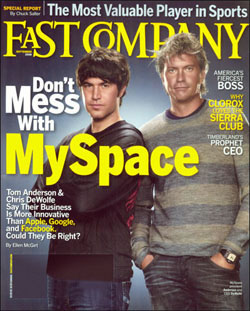
I predict that MySpace is going places!
Sure these ideas are silly and probably won't work, but what do I know about fixing failing fast food companies? I'm a games journalist; I'm not expected to know what will fix Burger King's woes. I was ready to write off this guy's article completely until I stumbled on his suggestion for Harmonix Music Systems.
Everybody knows that I'm a huge Harmonix fanboy, so I was genuinely shocked to read that one of my favorite game developers should make the next must-own first-person shooter. Yes, you read that right. In his October 19 article, Six Companies That Should Take the Plunge in 2012, Patrick actually suggests Harmonix make a Call of Duty clone. Sadly that's not the end of his lunacy. After spending a few minutes reeling from that bombshell, I knew what I needed to do. It's time to do some fact checking and show Mr. Sauer why his logic is fundamentally flawed!
Quote 1:
The One-Hit Wonder!
The One-Hit Wonder!
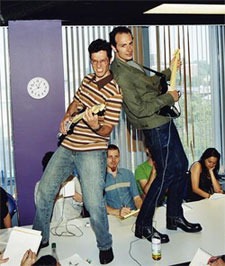
Had Harmonix spent a little less time rocking out on tables maybe they would have released a game in the last five years!
"The Problem: The firm behind Guitar Hero hasn't done much since."
Reality:
Harmonix hasn't done much since creating Guitar Hero back in 2005? It doesn't take a powerful high speed internet connection to know that Mr. Sauer doesn't know what he's talking about. A quick search of Wikipedia would turn up a solid half dozen releases, including a few that are genuine hits. Harmonix went on to make a name for themselves with three Rock Band games, which allowed gamers to use drums, vocals and even keyboards to be part of the music. Even though the first Rock Band wasn't able to reach the heights of Guitar Hero 3, it's worth mentioning that the Harmonix game did change the way Activision looked at plastic accessories, song exporting and downloadable content.
Harmonix is also known for The Beatles: Rock Band, the top selling music game of 2009. This was the game
I guess Patrick hasn't heard of Dance Central!
that bridged the generational divide, as noted by Mr. Sauer's own publication. After four years and five successful entries (not including the track packs, AC/DC Live game, etc.), it's hard to call Rock Band a failure. And don't even get me started on the success of the Rock Band music store and Rock Band Network, which spawned an entire cottage industry of wannabe game designers uploading hot tunes from indie bands.
But maybe, for argument's sake, Mr. Sauer doesn't consider Rock Band to be substantial enough to warrant mention. I mean, Rock Band 3 under-performed and there are plenty of industry types who have predicted the death of the guitar game genre. Then what about the two Dance Central games? This 2010 launch game was a genuine hit on the Kinect, staying in the NPD's top ten for months. Microsoft used the game as the selling point for their new technology, nothing something you can say about most games on the platform. From early reports, Dance Central 2 will also be a big hit. And considering that their new iOS game, VidRhythm, is tearing up the iTunes charts, I would argue that Harmonix has stayed plenty busy since creating Guitar Hero.
Harmonix is also known for The Beatles: Rock Band, the top selling music game of 2009. This was the game

I guess Patrick hasn't heard of Dance Central!
But maybe, for argument's sake, Mr. Sauer doesn't consider Rock Band to be substantial enough to warrant mention. I mean, Rock Band 3 under-performed and there are plenty of industry types who have predicted the death of the guitar game genre. Then what about the two Dance Central games? This 2010 launch game was a genuine hit on the Kinect, staying in the NPD's top ten for months. Microsoft used the game as the selling point for their new technology, nothing something you can say about most games on the platform. From early reports, Dance Central 2 will also be a big hit. And considering that their new iOS game, VidRhythm, is tearing up the iTunes charts, I would argue that Harmonix has stayed plenty busy since creating Guitar Hero.
Quote 2:
Consumers Against Disc-Based Games!
Consumers Against Disc-Based Games!
"Consumers are losing interest in disc-based video games."
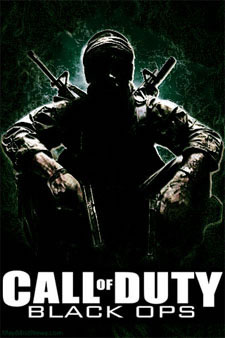
Selling 20 million units can only mean one thing: Disc-based games are a dying breed!
Reality:
This is one of those baseless statements you hear from time to time that begs to be fact checked. It's true that consumers are starting to warm up to the idea of digital distribution. Buying and downloading games is the new norm when it comes to PCs and iTunes sales have taken a big chunk out of traditional CD sales. However, one shouldn't extrapolate that information to mean consumers are losing interest in disc-based video games ... because they're not.
Consider this: The top selling console game of all time is Call of Duty: Black Ops. This 2010 disc-based game outsold the past Call of Duty titles by a substantial margin, and all forecasters predict that this year's Modern Warfare 3 has a chance to do the same. You don't sell twenty million units in under a year if the consumers are losing interest. Madden NFL is another bellwether game, having the strongest single-month sales in close to six years.

Somebody needs to let Batman know that Arkham City is going to be a huge flop!
One could argue that these comparisons are flawed because there is no way to this top-selling software via the Xbox Live Marketplace. However, Sony has been pushing for simultaneous releases of their biggest PlayStation 3 and PSP titles. Here again there is no information backing up the claim that people have lost interest in disc-based games. Mass Effect 2 did just fine on retail shelves, certainly outselling the digital counterpart released on the same day. If consumers were sick and tired of buying boxed copies, then you would see every company pushing for day one digital distribution. But that's not the case, and likely won't be for many years to come.
It's important to tell the difference between consumers warming up to digital distribution and consumers losing interest in disc-based games. The types of releases that are catching the internet by storm are often cheap and on cell phones. Considering how strong console game sales have been recently, it's safe to say that these two markets can co-exist. Unless you're Patrick Sauer, then you think that all games should be Angry Birds.
Consider this: The top selling console game of all time is Call of Duty: Black Ops. This 2010 disc-based game outsold the past Call of Duty titles by a substantial margin, and all forecasters predict that this year's Modern Warfare 3 has a chance to do the same. You don't sell twenty million units in under a year if the consumers are losing interest. Madden NFL is another bellwether game, having the strongest single-month sales in close to six years.

Somebody needs to let Batman know that Arkham City is going to be a huge flop!
It's important to tell the difference between consumers warming up to digital distribution and consumers losing interest in disc-based games. The types of releases that are catching the internet by storm are often cheap and on cell phones. Considering how strong console game sales have been recently, it's safe to say that these two markets can co-exist. Unless you're Patrick Sauer, then you think that all games should be Angry Birds.
Quote 3:
The First-Person Shooter!
The First-Person Shooter!

This is not the way to play a first-person shooter!
"Spend whatever it takes to create the world's first immersive shoot-'em-up, where gamers move their bodies to take cover."
Reality:
The name of the company is Harmonix MUSIC Systems, not Harmonix Maiming Systems. It's easy to see how Mr. Sauer came to this conclusion. He saw the evidence that most of the top selling Xbox 360 games are first-person shooters, looked at the turbulent couple years Harmonix has endured and put two and two together. What he's not factoring in is how difficult

No matter what name you slap on the box, Police 911 is a terrible game!
it is to make a groundbreaking release in a genre as crowded as this.
The reason why many of these games are so successful is because their developers have spent the better part of a decade tuning their craft. This is a highly competitive genre that you don't simply jump into, especially if your past experience has involved nothing but music games. To put it in music terms: It's like asking Snoop Dogg to write stirring classical music. He may be able to do it, but it will never be as good as Mozart or Bach.
Besides, the "world's first immersive shoot-em-up, where gamers move their bodies to take cover" has already been made. It's called Police 911 and wasn't as immersive as you would think. I would say that spending yourself into oblivion isn't the right way to run a company, especially if all that money is going towards a Police 911 clone.

No matter what name you slap on the box, Police 911 is a terrible game!
The reason why many of these games are so successful is because their developers have spent the better part of a decade tuning their craft. This is a highly competitive genre that you don't simply jump into, especially if your past experience has involved nothing but music games. To put it in music terms: It's like asking Snoop Dogg to write stirring classical music. He may be able to do it, but it will never be as good as Mozart or Bach.
Besides, the "world's first immersive shoot-em-up, where gamers move their bodies to take cover" has already been made. It's called Police 911 and wasn't as immersive as you would think. I would say that spending yourself into oblivion isn't the right way to run a company, especially if all that money is going towards a Police 911 clone.
Quote 4:
The Conflict of Interest!
The Conflict of Interest!

Do you remember a time when Celebrity Deathmatch was relevant?
"'It's bound to happen,' says Marc Nesbitt, a former video-game producer, 'and Harmonix has a head start with Kinect technology.'
Reality:
There are two reasons why you shouldn't take Marc Nesbitt's comments seriously. The first is his back catalog of games, which include both the dreadful MTV Celebrity Deathmatch game and the anime-inspired Starsky & Hutch. These releases don't even hint at competent game design, which puts Marc's opinion in serious doubt.
But the real kicker is who he used to work for: MTV Games. That's right, Viacom, who up until earlier this year owned Harmonix, used to employ Marc as a senior producer. You know who doesn't get a say in what you do next? Your past employer! The fact that Mr. Sauer decided to withhold this important piece of information makes me wonder how he ever got a job at Fast Company. But considering how inaccurate the rest of the article is, not disclosing Marc's blatant conflict of interest is the least unprofessional thing Patrick Sauer did this week.
But the real kicker is who he used to work for: MTV Games. That's right, Viacom, who up until earlier this year owned Harmonix, used to employ Marc as a senior producer. You know who doesn't get a say in what you do next? Your past employer! The fact that Mr. Sauer decided to withhold this important piece of information makes me wonder how he ever got a job at Fast Company. But considering how inaccurate the rest of the article is, not disclosing Marc's blatant conflict of interest is the least unprofessional thing Patrick Sauer did this week.
HOME |
CONTACT |
NOW HIRING |
WHAT IS DEFUNCT GAMES? |
NINTENDO SWITCH ONLINE |
RETRO-BIT PUBLISHING
Retro-Bit |
Switch Planet |
The Halcyon Show |
Same Name, Different Game |
Dragnix |
Press the Buttons
Game Zone Online | Hardcore Gamer | The Dreamcast Junkyard | Video Game Blogger
Dr Strife | Games For Lunch | Mondo Cool Cast | Boxed Pixels | Sega CD Universe | Gaming Trend
Game Zone Online | Hardcore Gamer | The Dreamcast Junkyard | Video Game Blogger
Dr Strife | Games For Lunch | Mondo Cool Cast | Boxed Pixels | Sega CD Universe | Gaming Trend
Copyright © 2001-2025 Defunct Games
All rights reserved. All trademarks are properties of their respective owners.
All rights reserved. All trademarks are properties of their respective owners.














